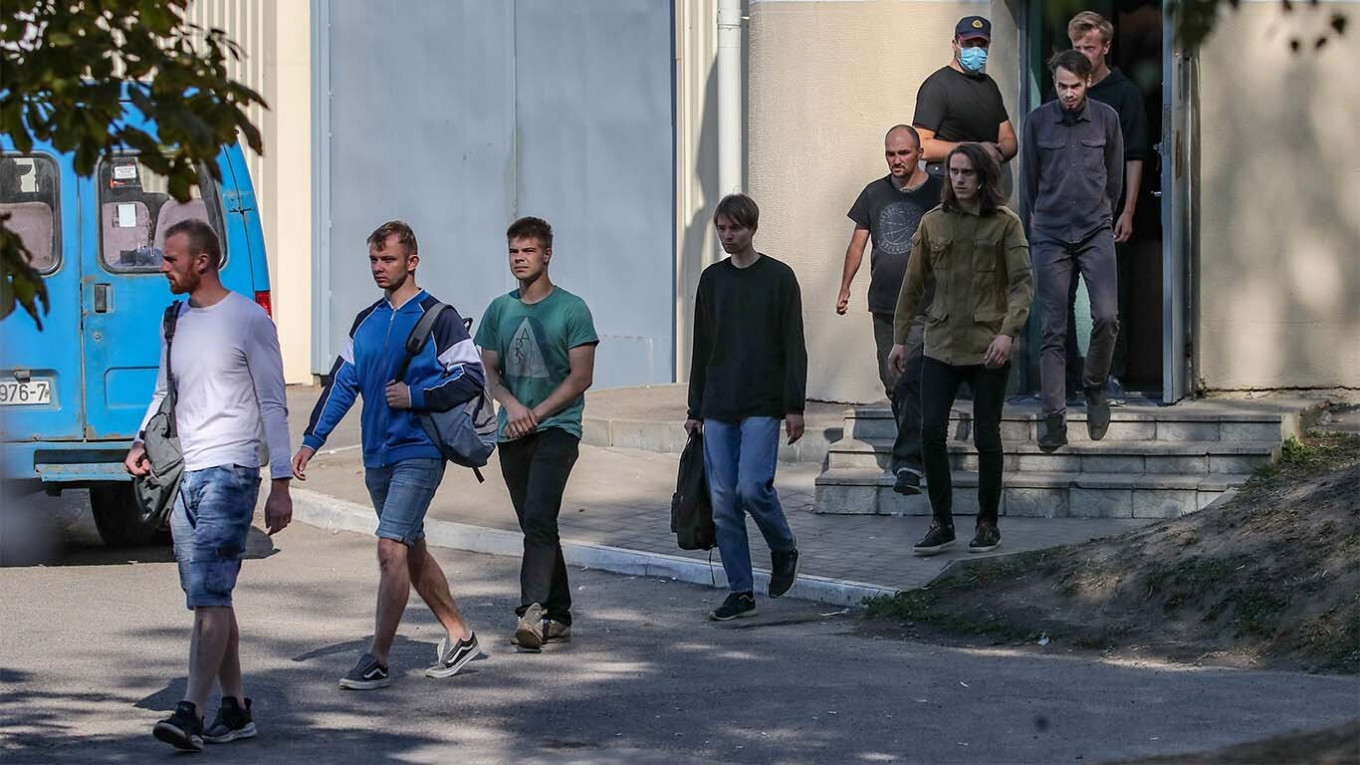
The main challenger in Belarus’s disputed presidential election called for mass weekend rallies and workers were walking off the job on Friday as defiance mounted against strongman leader Alexander Lukashenko.
In a video address to supporters, Svetlana Tikhanovskaya accused Lukashenko’s regime of a “bloody massacre” in a crackdown on post-election protests, as people detained during the demonstrations began to emerge from jail with harrowing accounts of beatings and torture.
Crowds of workers started to heed calls from the opposition to walk off the job. AFP journalists saw hundreds of employees gathered in uniforms and hardhats outside the Minsk Automobile Plant (MAZ) and the Minsk Tractor Works (MTZ).
Calls were growing for international action, with Germany throwing its weight behind a drive to level sanctions against Belarus ahead of a meeting Friday of European Union foreign ministers.
“Belarusians will never want to live with the previous government again. The majority do not believe in his victory,” said Tikhanovskaya, who left the country for neighboring Lithuania on Tuesday.
“I ask the mayors of all cities to organize peaceful mass gatherings in every city on Aug. 15 and 16,” she said.
Tikhanovskaya and her supporters dispute Lukashenko’s claim to have won Sunday’s election with 80% of the vote and thousands have taken to the streets of the capital Minsk and other cities over the past six days.
Police have used rubber bullets, stun grenades and, in at least one case, live rounds to disperse the crowds, with hundreds injured.
‘Campaign of widespread torture’
Officials have confirmed two deaths in the unrest, including one man who died during a demonstration in Minsk and another who died in custody after being arrested in the southeastern city of Gomel.
At least 6,700 people have been arrested, but in a surprise move on Thursday officials announced they would start releasing detainees and the interior ministry said Friday more than 2,000 had so far been set free.
Detainees emerging from a detention center in Minsk told AFP they had been beaten and deprived of food, water, sleep and medical care.
“They burned my hands with cigarettes,” said Maxim Dovzhenko, 25, who insisted he had been detained even though he was not taking part in protests.
“They hit me on the head, I am not feeling well, my head is spinning,” he said before being taken to hospital.
Mikhail Chernenkov, a 43-year-old entrepreneur, said he was given electric shocks and beaten with sticks in a police station, showing AFP his bruised buttocks.
“This is torture,” he said, adding that like many others he was forced to sleep outside because cells were overcrowded. He also said he did not take part in the protests.
Hundreds of friends and relatives were waiting outside the detention center, where volunteers were handing out food and blankets.
In a statement, Amnesty International condemned “a campaign of widespread torture and other ill-treatment by the Belarusian authorities who are intent on crushing peaceful protests by any means.”
Germany backs EU sanctions
EU foreign ministers were set to meet in Brussels for talks on Belarus, with EU Commission President Ursula von der Leyen saying she was “confident” they would back sanctions.
German government spokesman Steffen Seibert said Chancellor Angela Merkel had been “shocked” by the detention and abuse of peaceful protesters.
“In our view sanctions against those responsible for human rights violations will have to be discussed,” he said.
Belarus’s Foreign Minister Vladimir Makei said in a call with his Swiss counterpart that Minsk was ready for “constructive and objective dialogue with foreign partners” on the election and its aftermath.
In a dramatic show of defiance on Thursday, thousands of people formed human chains and marched in Minsk, many wearing white and holding flowers and balloons, to protest against police brutality.
Similar human chains formed in half a dozen other cities.
Lukashenko, who has ruled Belarus with an iron grip since 1994, has dismissed the demonstrators as foreign-controlled “sheep” and “people with a criminal past who are now unemployed.”
In a televised meeting with construction industry representatives, he rejected claims that he had fled the country.
“I am alive and not abroad,” he said, before warning that work stoppages would benefit Belarus’s foreign competitors.
The protest movement arose in support of Tikhanovskaya, a 37-year-old political novice who ran for president after potential opposition candidates including her husband were jailed.
The official results gave her 10% of the vote, but Tikhanovskaya said the election was rigged and claimed victory, demanding that Lukashenko, 65, hand over power.
She left for Lithuania as allies said she came under official pressure.
